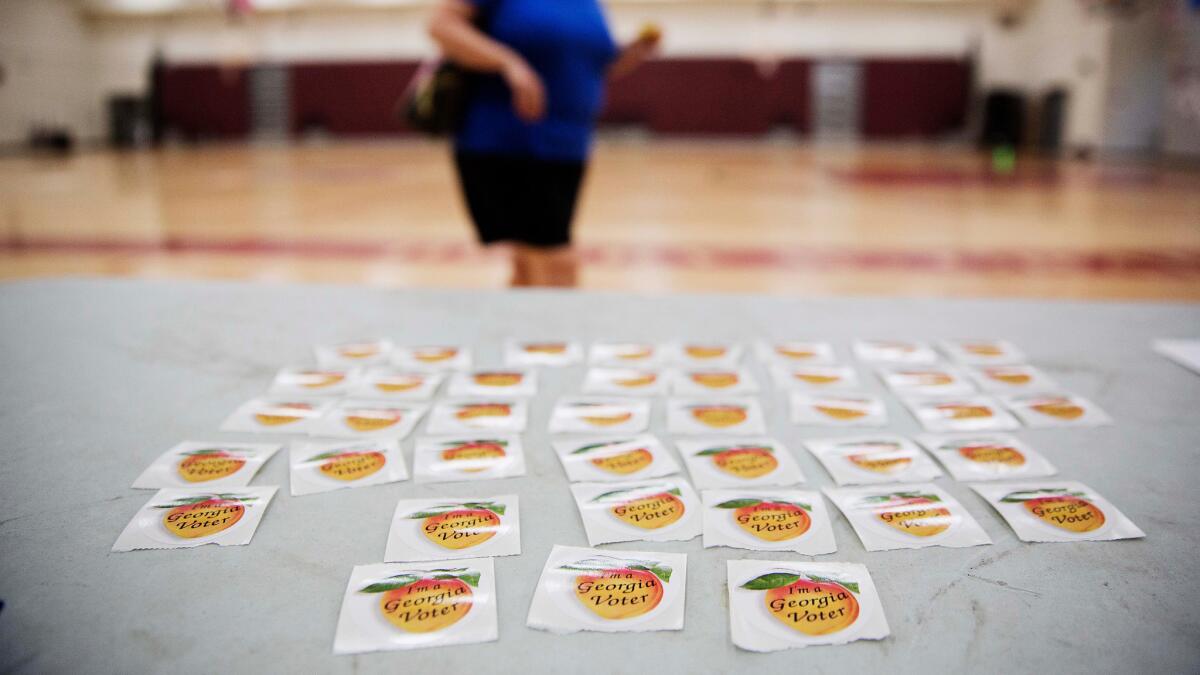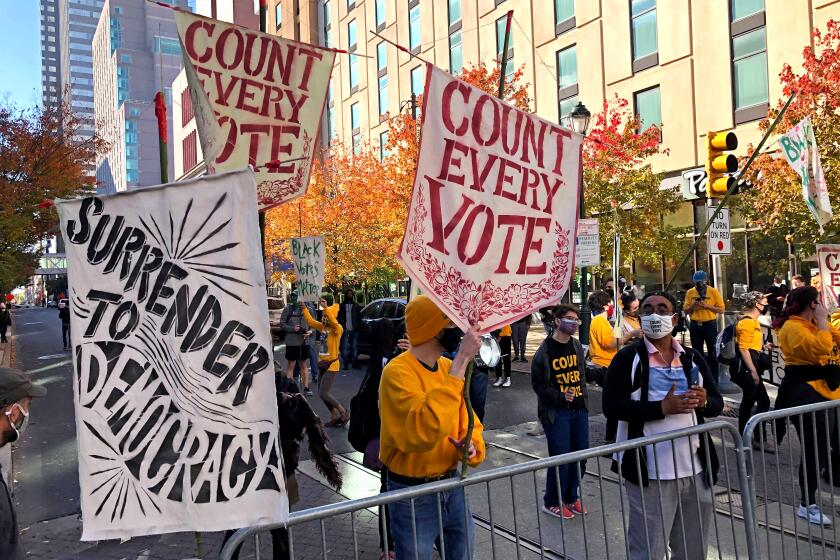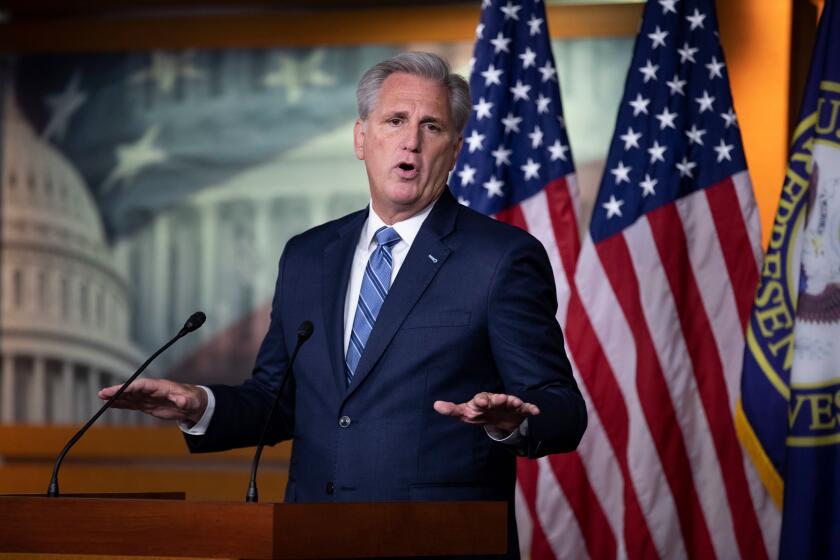This election is depressing. But Georgia gives me hope

- Share via
ATLANTA — It seems likely President Trump’s reign is nearing its end.
As I write this Thursday morning, former Vice President Joe Biden seems poised to reach the 270 electoral votes needed to reach the White House. And while this presumed victory is a sigh of relief for those vehemently opposed to Trump, for a young person like me, the razor-thin margins in states like Wisconsin, Michigan and Georgia, leave me wary of the future.
Pollsters again vastly underestimated Trump’s support. They had me believing I could soon use the word “Trumpism” as a scary synonym for far-right politics that threaten the most vulnerable, just as conservatives use “socialism” to describe anything the rest of the industrialized world does. Instead, Trump and the politicians who enabled him have gotten a hefty amount of America to support them yet again. It suggests that progressive policies important to my generation — like eliminating student loan debt, reforming criminal justice and addressing climate change — may not be achieved this decade.
As the election results poured in over the first 48 hours, I have spoken — nine times at last count — with my best friend, Guy Russo, who was my classmate at Vanderbilt University and now teaches high school Spanish in Nashville. We were peeved by how competitive Trump was in spite of his reprehensible behavior over the past four years.
For Guy, who is 24 and whose parents are of Thai and Italian heritage, it’s inexplicable that America “nearly elected a racist in 2020.”
A person (though not me) could attribute Trump’s 2016 victory — even after launching his first campaign in the ugly soil of birther conspiracy and calling Mexican immigrants drug-dealing rapists — to low voter turnout. Trump, it was said, caught many of by surprise.
Despite the historically high turnout, the right to vote has been under siege in 2020 and that needs to be a focus of the postmortem on this election.
But this time, turnout was its highest in at least a century. Voter determination was high — on all sides. Even after a presidency in which Trump referred to white supremacists as “very fine people,” banned most transgender people from serving in the military, intentionally downplayed the severity of the novel coronavirus that has so far killed more than 230,000 Americans, some 69 million people voted for him, as of Thursday evening.
What the hell?
To young voters like me and Guy, this track record should have been more than enough to disqualify a politician. But for some who embrace his policies, it’s not. And this reality leaves us fearful that someone like Trump — or even Trump himself — can win a future election.
“America needs a very strong humbling,” Guy told me, “and that will only come when America is over.” He added: “I feel like the American empire is going to end in my lifetime.”
American propaganda tells us it is the greatest country on Earth. But the COVID-19 pandemic further exposed to the world deep inequities in health care, housing and job security. And for Russo, the resolve, of nearly half of the country, to back a man gleefully sowing discord in our democracy proves the United States is far from being the model constitutional republic it claims it is.
When I saw Trump won Ohio, I thought of another college classmate, Justin Hutchings, now living in the Cincinnati suburbs.
Don’t look for many profiles in courage from the president’s party.
On the phone, Justin, a 23-year-old bank auditor who is Black, shared my pessimism about the future.
“Even if Joe Biden wins,” he told me, “a lot of the structural changes we badly need are up in smoke,” because Republicans have a great shot at retaining their Senate majority.
Reshaping the federal judiciary so it can be an avenue for progressive change, as it was at times in the 1960s and 1970s, will likely not happen if Sen. Mitch McConnell (R-Ky.) remains the majority leader.
Justin acknowledged America has since the 1960s made substantial progress over civil rights. But, we are living in a time when “Republicans are constantly pulling the nation to the right and Democrats aren’t empowered enough and don’t have the backbone to fight back and pull the nation left,” he said.
“There’s no end in sight to worrying about disenfranchisement, police brutality, equality for LGBTQ people, and a woman’s right to abortion will be taken away,” Justin told me.
Justin is also concerned with how callous some public officials and citizens seem about democracy. Trump and his allies are simultaneously pushing for some states to continue counting — and for other states to stop — so the election goes his way. On Thursday afternoon, Donald Trump Jr. vowed “total war.” Already, people are in the streets, both for and against Trump. Buildings in cities across America, from Los Angeles to Atlanta, have been boarded up for fear of post-election violence. Whoever would have dreamed this would happen in America?
“If you would’ve told me five years ago there would be a debate on whether or not to count every vote, I would’ve laughed,” Justin told me. “And now, here we are.”
Of course, tension over democracy has always existed here. Genocide and slavery marred this nation from even before its inception. Lawmakers fought to deny Black people, women and poor white men the right to vote. And though Congress in 1965 passed legislation to expand participation in democracy, the Supreme Court in 2013 effectively gutted the 1965 act and allowed local officials to ramp up questionable practices like purging roles, gerrymandering, ID laws and closing polling locations with no federal oversight.
Justin noted that these are not the only form of voter suppression. Making the voting process so complicated a “significant number of people just give up,” he surmised. That too suppresses the vote.
While Justin on Tuesday worked as a poll watcher in a school for 13 hours, he witnessed voters get turned away for a variety of reasons. One voter thought a passport would suffice as an ID. (It didn’t.) Another who lived across the street from one polling site was shocked to learn he was supposed to go to another location.
Justin wondered how many of these people ended up voting that day and whether the United States is even a nation worth staying in. Justin will enroll in Harvard Law School next fall, so for at least these next few years, he will stay. But when he imagines his future and where to have a family, it is not necessarily the United States.
Adam Jenkins, a Black 27-year-old Atlanta resident I met on a crisp day last week at a Biden rally, told me about his voting experience.
Jenkins, who will study economics next year at Georgia State University, told me that he and his partner, Kristen Vermetten, 29, both registered to vote at the same time on her phone in August. But when they arrived at the State Farm Arena in late October, Vermetten, who is white, learned that her registration had been accepted while Jenkins’ was not. A poll worker told them Jenkins could cast a provisional ballot but warned it might not be counted.
“When you know Georgia is already suppressing minority votes, they’re not going to count it,” Jenkins told me.
So, after Vermetten voted in five minutes, the couple resolved to rent a car and drive four hours to Chatham, a county in southern Georgia where Trump’s campaign sued over ballot counting. They waited two hours for Jenkins to vote.
You could read this as a touching testament to a young voter’s determination to make his voice heard. But, it’s important to keep in mind the kinds of resources required to abruptly rent a car, drive four hours, wait in line for two hours, and drive back four hours just two days before rent is due.
How many people faced these obstacles to voting? How many were able to find a way around it?
The hoops voters like Jenkins have to jump through are wrong and anti-democratic.
But all is not lost. And Georgia proves that.
As I write this, Biden is within striking distance of surpassing Trump — a feat no Democrat running for president has managed in the Peach State since 1992. And local Democrats here tell me a Biden victory could mean they can control the State House and perhaps pass laws that make it easier to vote.
Georgia has for the past few years seen an uptick in voter registration. And this is in large part thanks to efforts like the New Georgia Project which was formed after the Supreme Court gutted the Voting Rights Act in 2013. So, since 2014, the group has focused on engaging young people of color, Nse Ufot, executive director of the organization, told me, and registered nearly half a million.
While young people do not always vote for Democrats (in Georgia, 90% of Black youth backed Biden, while 63% of white youth backed Trump), widening access to the political process and encouraging engagement gives my generation a chance at making a better future.
I know this year has been depressing. Learning how to be an adult during this political climate and during a global pandemic is not easy. But my home state is a model for how we can change our future.
My favorite singer, America’s un-canceled princess Taylor Swift, captured the optimism I see in Georgia in a song.
They aren’t gonna help us
Too busy helping themselves
They aren’t gonna change this
We gotta do it ourselves
They think that it’s over
But it’s just begun
Only one thing can save us
Only the young
We don’t have to be like our parents and grandparents — engaging in messy Facebook arguments, denying science, drawing immovable partisan lines in the sand and refusing to give each other the equality we deserve.
Eventually, everyone older than us will pass and my generation — I was born in 1995 — will have to live with the consequences of their decisions. We just have to find a way to dissolve this iron wall that impedes meaningful change, before it’s too late.
Federal legislation addressing criminal justice and climate change can be considered if Democrats are able to reclaim the Senate. And it looks as if the battle for the Senate might come down to two Georgia run-off elections on Jan. 5. The Rev. Dr. Raphael G. Warnock faces Sen. Kelly Loeffler, who once called herself “more conservative than Attila the Hun.” Another Democratic challenger, Jon Ossoff, will face Sen. David Perdue, who also dumped stocks and mocked the name of Kamala Harris, Biden’s running mate.
I encourage every Georgian to research each candidate and not let their voices go unheard.
More to Read
A cure for the common opinion
Get thought-provoking perspectives with our weekly newsletter.
You may occasionally receive promotional content from the Los Angeles Times.












